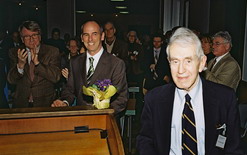
Das langjährige Mitglied im Beirat der Forschungsgemeinschaft 20. Juli 1944, Prof. Dr. Klemens von Klemperer,Northampton (Massachusetts, USA), verstarb am 23.12.2012 im Alter von 96 Jahren. Klemens Klemperer wurde im Jahr 2010 für seinen unermüdlichen und jahrzehntelangen Einsatz im Zusammenhang mit der Forschung über die Hitlerdiktatur und den Deutschen Widerstand mit dem „Dorothee-Fliess-Preis für Widerstands-forschung“ geehrt.
Lesen Sie: Nachruf von Dr. Ekkehard Klausa im „Tagesspiegel“ sowie Tribute to Klemens
One of Klemens’ exceptional talents was his capacity for deep friendship. He had three home countries: Germany, where he was born, Austria, where his family came from and where he sought refuge from the Nazis from 1933-38, and finally the United States. And he leaves behind in all three of these countries people for whom this friendship was truly remarkable, intensely moving. His profound sense of caring reached out to the hearts of people and embraced not only three countries, but also three generations. He was the schoolmate and close friend of my mother’s brothers, all of whom attended school at the French ‚Gymnasium’ in Berlin, and to whom he makes a fond dedication in his memoirs; a generation later, he became one of my best friends and my brother says the same for himself. And his charisma was such that he also captivated my sons, who, as small boys got to know him over a longer period of time as our guest in the eighties. When my son, Johannes, spent a year at highschool in Louisiana at the age of fifteen, he set off on a forty-two-hour journey in a Greyhound bus, in order to be able to see Klemens and Betty again here in Northampton. They were away when he arrived, and so he spent that night in a flower bed in their garden, until they returned. It was far more than a family friendship. Klemens’ relationship to people of all ages and backgrounds came straight from his heart.
Even his professional contacts soon turned into friendships. He was on the Advisory Board of the Gedenkstätte Deutscher Widerstand, the German Resistance Memorial Center, and three years ago, he received a lifetime achievement award from the Forschungsgemeinschaft 20. Juli 1944 (Association for Research on the German Resistance). Both institutions and their representatives, Peter Steinbach and Johannes Tuchel of the Gedenkstätte and Friedrich von Jagow and Joachim Scholtyseck of the Forschungsgemeinschaft, have requested me to express not only their respect and affection for Klemens today, but also their appreciation for his contribution as a scholar and a private person.
When his native country, Germany, fell prey to the Nazis, he and his family were stripped of their home, assets, art collection and their civil rights. He encountered a new homeland „in the land of the free“ where, as a US soldier, he helped to liberate his first homeland; later on, he matched with goodness the evil which he had experienced there. For as a historian, he dedicated large parts of his scholarly life to convincing his new homeland of the existence of the „other Germany“, a humanist one of anti-Nazis and individuals who, by going against Hitler, jeopardized their freedom and their lives, and who lost them by the thousands. He was a critical realist and well aware that not all resisters were saints, as was his beloved Dietrich Bonhoeffer, whom he proposed to the Pope as a candidate for canonization by the Catholic Church, even though Bonhoeffer was a Protestant minister. On the other hand, many of the men who wanted to overthrow Hitler on the 20th of July, 1944 had, for years, succumbed to the temptation of Hitler’s imperialism and propaganda. Klemens knew this and criticised them; but in contrast to some young historians who, with the intelligence of hindsight – or, as the Americans put it, as „Monday-morning quarterbacks“ -, tended to lecture these resisters condescendingly, Klemens treated them with great respect when, as he said, they had finally arrived at the determination to resist „via rough and untrodden paths“, as Klemens put it: Auf ungeebneten Wegen in den Widerstand.
It is with gratitude and affection that we Germans take leave of a fellow-countryman who was wrenched away from us by a barbaric regime and restored to us by virtue of his loyalty and love for what was noble in Germany. Because of what started eighty years ago in 1933, Germany has lost so much excellence to America – when so many of the best Germans were forced into exile. However, Klemens was not just part of pre-1933 Germany, but for more than six decades he was also part of democratic, postwar-Germany. His scholarly work as well as numerous lecture visits, board meetings, and a guest professorship made of him a ‚human Atlantic bridge’. His memory will live on in all three of his homelands.
The other day. my son Johannes wrote me from Korea where he is presently working: “My picture of Klemmy will always be one of a ceaseless traveller, carrying only the lightest of baggage, but nevertheless always tidy and – despite the jetlag – approachable and loving. His last journey will have been the shortest one, as it led him, I am quite sure, without detour or delay, straight to Heaven.”
Thank you, dear friend, Klemens.
Ekkehard Klausa
